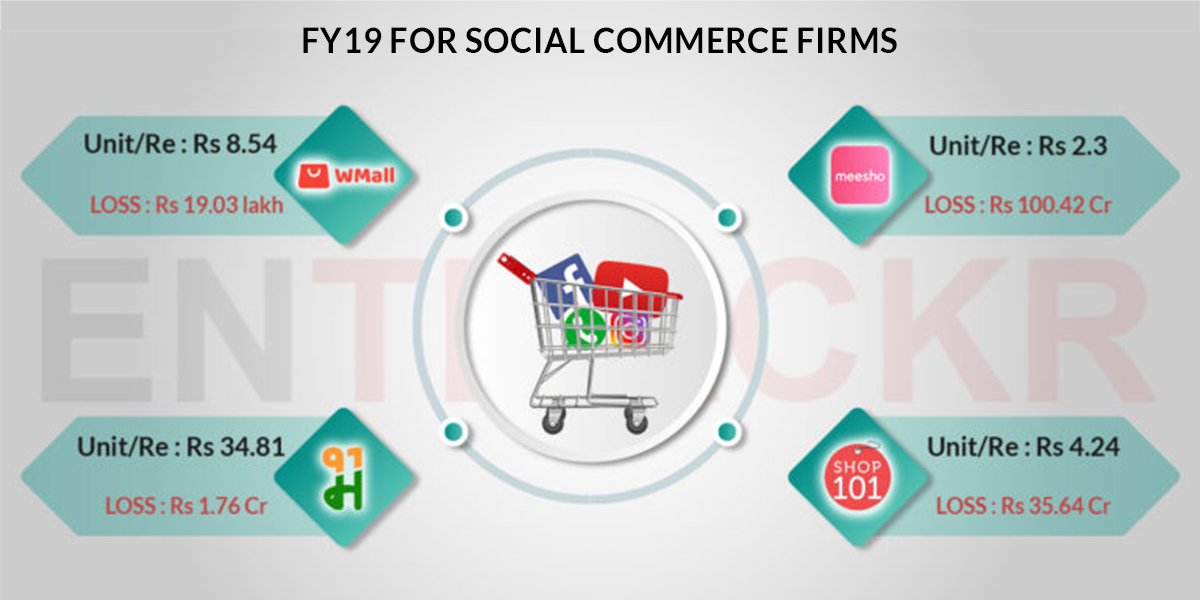Indian venture capitalists and entrepreneurs love replicating a good China story.
The last two years saw the exponential growth of Chinese social commerce — a new flavour to traditional e-commerce which uses social media and social interaction to assist in the buying and selling of goods online. The euphoria peaked in 2019 when the market size of the Chinese social commerce crossed $250 billion.
India mirrored the excitement with companies such as Meesho and Shop101 raising large sums of money in 2019. In an attempt to replicate the Chinese social commerce success, several Indian clones also sprung up with investors willing to pour money into proven business models. These include the likes of Mall91, EkAnek, BulBul Shop and SimSim — few of which raised funds even prior to an idea in place. Case in point would be EkAnek that raised $10 million from marquee investors such as Sequoia, Lightspeed and Nexus several many months before kicking-off operations.
But the buzz around the sector is slowly subsiding citing viability issues, say several venture capitalists and industry experts.
“The confidence of investors in the social commerce format is slowly fading as unit economics for scaled companies in the segment isn’t improving,” said a VC who invested in one of the top two social commerce companies, on condition of anonymity. “Most of the companies are grappling with a problem of high return rates due to poor product quality.”
Naspers-backed Meesho, which leads the pack with respect to fundraising and order numbers, has witnessed a drop in order volume, according to three people aware of the matter. It currently stands at 75,000 daily orders, down from 100,000 in May. Similarly, Kalaari Capital-backed Shop101 processes around 20,000 daily orders — a drop from 30,000 in July.
Both Meesho and Shop101 said that these numbers are inaccurate and growth on their platform hasn’t slowed down.
“We have been unit profitable for most of our journey and we have been more capital efficient than any other e-commerce company before us in India,” said Meesho’s chief executive Vidit Aatrey.
The company is now in the process of launching operations in Indonesia as it seeks growth, according to multiple people aware of the development. Moreover, Meesho has also been trying to experiment with selling financial services in a bid to diversify its offerings beyond products, added the people cited above.
The business model of social commerce companies has been to build a technology platform, sign up sellers and then enlist resellers — those who would sell the merchandise of the sellers to their social networks. The resellers would earn a self-determined mark-up and the platform would handle shipments, returns and payments. One of the major selling points was that there would be no customer acquisition cost for the platform (unlike traditional e-commerce firms).
Seemed like a simple model that was ostensible to be driven by the enterprise of the sellers and resellers, utilising the familiarity and implicit trust of people buying from people they know. And of course, the allure of reaching 500 million non-English speaking population.
While the basic idea of replicating the buying and selling of unbranded goods from the offline world to the online world sounds good in theory, it is replete with challenges when executed.
The starting ordeal is with the poor quality of merchandise that is listed on the social commerce platforms, say multiple people Entrackr spoke with. This also results in high number of returns — a problem these platforms are unable to cope with efficiently.
Meesho’s Aatrey, however, says that their platform doesn’t face these issues.
“Our returns have always been lower than 15% and we take pride in selling only high quality products on our platform (seller deactivation in case of bad quality products is very common on our platform),” said Aatrey. “This makes sure that the consumers of our resellers are happy and continue to buy from resellers. Our reseller NPS has been growing every month for more than a year.”
Shop101’s chief executive Abhinav Jain echoes similar thoughts about their platform. “Our return rates are lower than 10%,” he said. “Our unit economics are positive and actually take into account the cost of returns.”
But sellers paint a different picture. They are getting increasingly critical and vocal about the practices of companies like Meesho, where the sellers are being made to pay for the infirmities of the business model. A post on quora by a Bengaluru-based seller of scarves has received nearly 40,000 views, in which the seller has narrated her woes.
Many such complaints (such as this, this and this) about Meesho can be found on Quora and Mouthshut.
Sellers complain that the platforms only care about their resellers, while the resellers voice their concern about the low quality of products listed by the sellers. To make matters worse, buyers complain about the lack of response.
Meanwhile, the pile of returns and unsold inventories is getting higher, say multiple people aware of the development.
Venture capitalists who have invested in the social commerce space are concerned due to the slowdown in growth coupled with no signs of an improvement in the unit economics. Moreover, with several startups to have sprung up over the last year, this space has become crowded and competitive.
“Moreover, there is no big success to look up to globally,” said one of the people cited above. “Even in China, social (including video commerce) commerce has been dominated by e-commerce companies such as Taobao, Tmall and Ali Express. Pinduoduo is the only company to have made a dent but it has a very different model from what Indian companies have.”
That said, a few other investors continue to stay bullish on their social commerce bets. They believe that influencer-driven commerce is bound to continue and grow. Moreover, with unbranded products comes higher commission structures, which is an advantage social commerce firms enjoy over other e-commerce companies selling branded products. A combination of these reasons will make the social commerce business sustainable, they believe.
“The thesis is very simple. For long tail products, it will be hard for a Flipkart or Amazon to sell it. But if it comes from an influencer who is seen as an expert on that product, then people who follow them will buy it,” said an investor in two social commerce companies, requesting anonymity. “Having said that, a major challenge in this space is the low ticket size which these companies are addressing by trying to bring the last-mile delivery costs down.”















